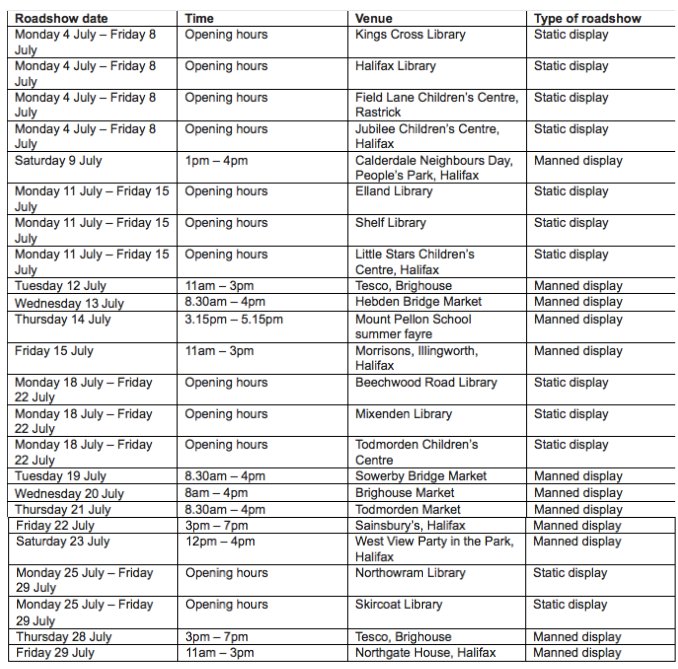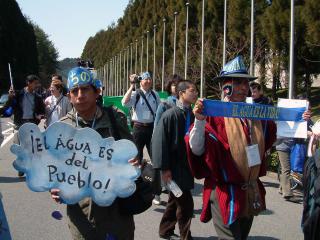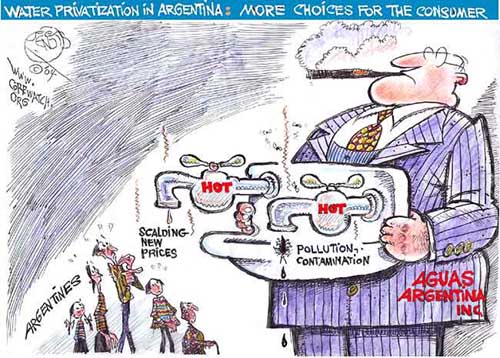Calderdale Council has awarded a new waste and recycling collection contract, with an estimated value of between £110,000,000 and £130,000,000, to a global company, SUEZ, that puts profits above the human right to water and other vital utilities, leading to massive protests in Argentina and Bolivia.
A SUEZ subsidiary, Sita, has been collecting our waste and recycling for years, under a previous Calderdale Council outsourcing contract that kicked aside the community recycling collection company, Kerbside.
If you are a Calderdale resident, please consider signing and sharing the Calderdale Public Service Users Petition.
Hundreds of people have already signed it at street stalls and hundreds more have signed it online. The petition needs 2,000 Calderdale signatures to trigger a debate in full Council about its demands.
These are, that Calderdale Council sets up a new procedure for providing public services, so that the Council:
- is always the preferred provider
- publicly justifies every decision to privatise services
- only awards contracts to companies that observe both UK and international Human Rights Law, recognise Trade Unions, pay a living wage and have no history of fraud, tax dodging or endangering public or employees’ safety
- fully informs the public about all public service contracts, at all stages- from what contracts cover to how the Council manages them
- favours local companies and requires big contract winners to subcontract to local companies
How will the new contract affect household recycling and waste collection?
From 1 August 2016, Calderdale households will be able to recycle corrugated cardboard, plastic pots, tubs and trays, Tetra Pak cartons and small electrical equipment – but not batteries, in addition to the cans, glass bottles, jars, plastic bottles, newspapers, magazines, textiles and food – which we already do.
(To recycle batteries, we will have to take them to Calderdale Council’s Household Waste Recycling Centres or to supermarkets which recycle them.)
There will be changes to the way we put out materials for recycling.
At the moment, we place glass and recyclable cans in a black recycling box.
From 1 August, people should place glass in their recycling box alongside corrugated cardboard and small electrical items.
Cans will be collected in the white sacks, along with the different plastics.
If you live in a flat, you will be able to increase the range of materials you recycle, to include plastics, cardboard and Tetra Pak cartons.
People who do not have a wheelie bin, but put their non-recyclable waste in sacks, will only be able to put out a maximum of four bags each fortnight, because the recycling service will be collecting a lot more stuff that it does at the moment. Four sacks is the same as a wheelie bin holds.
Many people will have their waste and recycling collected on a different day than at present, so some residents might experience a one-off delay in the time between their refuse collections. The Council will contact those directly affected.
The Council is sending information to every home during July. They are also holding recycling roadshows where people can find out more and ask questions.
From the end of July, people can also confirm their bin collection day online, here.
You can also sign up to receive reminders about their waste and recycling days and any changes due to bank holidays by visiting the online Collection day finder.
The recycling roadshows will be held on the following dates:
 There is more info here about waste and recycling collection services, along with details of the Council’s five Household Waste Recycling Centres. There will also be updates on Twitter @recycle_waste.
There is more info here about waste and recycling collection services, along with details of the Council’s five Household Waste Recycling Centres. There will also be updates on Twitter @recycle_waste.
SUEZ – the global company that puts profits above the human right to water and other vital utilities
SUEZ (Paris: SEV, Brussels: SEVB) is the company that the Council has outsourced its waste and recycling collection services to.
SUEZ is a global waste and water company that puts profits above the human right to water and other vital utilities.
In 2015, Suez won a ruling from the International Investment Dispute Tribunal in New York that ordered Argentina to pay Suez $405m, on the grounds that human rights to water and vital utilities cannot override investor rights to profit.
Suez took the Argentina government to an International Investment Dispute Tribunal, because some years ago the Argentinian government fixed the price of water, gas and electricity, and later nationalised vital utilities, in order to protect people’s human right to access to water and vital utilities. This was to stave off price hikes by GDF-Suez and other companies, that would have made water and other vital utilities unaffordable for many people.
Calderdale Council isn’t the only public body in Calderdale that’s contracted out public services to the a subsidiary of the Suez company – Cofely-Suez GDF has bought out the PFI facilities management contract with Calderdale and Huddersfield NHS Foundation Trust.
What conditions should Calderdale Council require companies to meet, if they want to bid for public service contracts?
Calderdale Council sends out a Pre-Qualification Questionnaire (PQQ) to companies that want to bid for contracts to deliver its services. The PQQ has an Equalities section that asks if the company:
“encourages compliance with the Human Rights Act”.
Given that companies like Sita have a global reach, surely the PQQ should ask if companies that want to run our public services comply not just with the Human Rights Act, but with the International Bill of Human Rights?
And Calderdale Council’s PQQ asks companies nothing about complying with Employment Law, recognising Trades Unions, or complying the Council’s Living Wage policy. Surely these should be essential pre-conditions for any companies that want to provide our public services?
If you are a Calderdale resident, please sign the Calderdale Public Service Users petition.



Sita also has a contract with Kirklees Council.